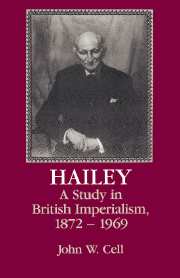Book contents
- Frontmatter
- Contents
- List of abbreviations
- Glossary of foreign words
- Preface
- 1 Early life
- 2 Colonization officer, 1901–1906
- 3 From Sargodha to Delhi, 1907–1912
- 4 Chief commissioner of Delhi, 1912–1918
- 5 A report on the Punjab
- 6 Finance member, 1919–1922
- 7 Home member, 1922–1924
- 8 Governor of the Punjab: the Sikhs, 1924–1925
- 9 Governor of the Punjab: the communal problem, 1924–1926
- 10 Governor of the Punjab: the communal problem, 1927–1928
- 11 Governor of the United Provinces, 1928–1930
- 12 Governor of the United Provinces: civil disobedience and Round Table Conference, 1930–1931
- 13 Governor of the United Provinces: 1931, year of crisis
- 14 Governor of the United Provinces: winding down, 1932–1934
- 15 Surveyor of Africa, 1935–1939
- 16 Two missions to Africa, 1939–1940
- 17 A report and a vision, 1941–1942
- 18 Adviser and propagandist, 1942–1945
- 19 Indian partition and the onset of African decolonization, 1945–1949
- 20 Defender of the faith, 1949–1969
- Bibliography
- Index
10 - Governor of the Punjab: the communal problem, 1927–1928
Published online by Cambridge University Press: 12 October 2009
- Frontmatter
- Contents
- List of abbreviations
- Glossary of foreign words
- Preface
- 1 Early life
- 2 Colonization officer, 1901–1906
- 3 From Sargodha to Delhi, 1907–1912
- 4 Chief commissioner of Delhi, 1912–1918
- 5 A report on the Punjab
- 6 Finance member, 1919–1922
- 7 Home member, 1922–1924
- 8 Governor of the Punjab: the Sikhs, 1924–1925
- 9 Governor of the Punjab: the communal problem, 1924–1926
- 10 Governor of the Punjab: the communal problem, 1927–1928
- 11 Governor of the United Provinces, 1928–1930
- 12 Governor of the United Provinces: civil disobedience and Round Table Conference, 1930–1931
- 13 Governor of the United Provinces: 1931, year of crisis
- 14 Governor of the United Provinces: winding down, 1932–1934
- 15 Surveyor of Africa, 1935–1939
- 16 Two missions to Africa, 1939–1940
- 17 A report and a vision, 1941–1942
- 18 Adviser and propagandist, 1942–1945
- 19 Indian partition and the onset of African decolonization, 1945–1949
- 20 Defender of the faith, 1949–1969
- Bibliography
- Index
Summary
From his idealistic vision of a society freed from the curse of religion gone wrong, Hailey returned in January 1927 to the humdrum reality of communal politics. The election had virtually wiped out the Swarajists, while the “party” of the Hindu Jat minister Chhotu Ram had been reduced by half, that is, to two. The situation having become ridiculous, Sir Malcolm consulted the two most powerful men in the Legislative Council, Raja Narendra Nath and Sir Fazli Husain, about the option of appointing a third minister. The former told him that urban Hindus would be able to cooperate with rural members. In particular they would not attempt to repeal the Land Alienation Act of 1900, as they had long threatened to do, and they would accept communal representation in district and municipal bodies. Although Sir Fazli objected strenuously Hailey went ahead, dropping Chhotu Ram and naming two new ministers, Manohar Lai (Hindu) and Feroz Khan Noon (Muslim), while retaining Jogendra Singh (Sikh), whom he had appointed in January 1926. His motive, he explained, flatly contradicting his reasoning of September 1924, was to capitalize on the aloofness of provincial Hindus from Congress.
The cabinet shuffle of January 1927 remained controversial. According to Hailey he wanted to hold the scales between contending communities and keep Punjab Hindus separated from Congress.
- Type
- Chapter
- Information
- HaileyA Study in British Imperialism, 1872–1969, pp. 141 - 154Publisher: Cambridge University PressPrint publication year: 1992



